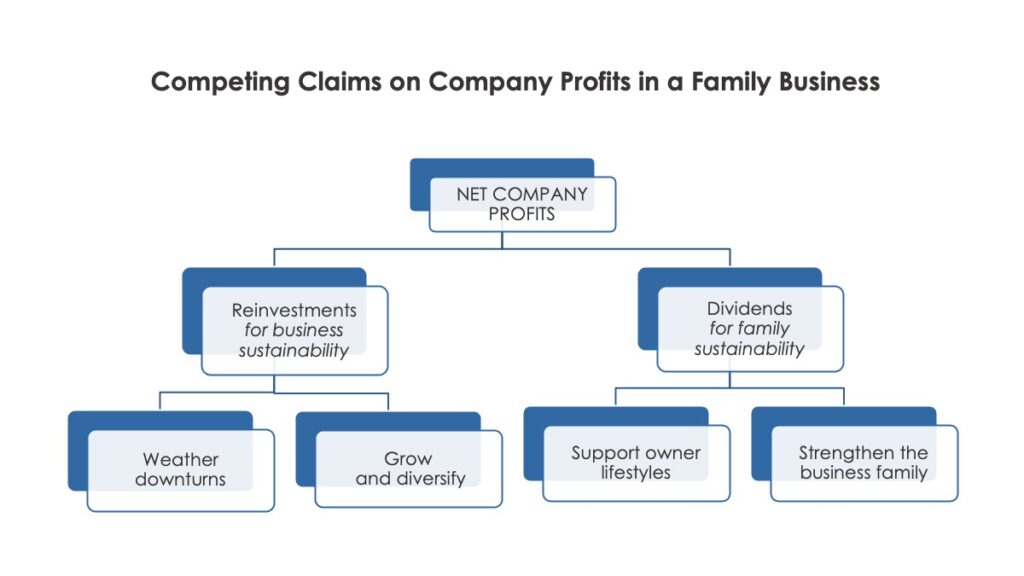
How can family businesses make the tough decision of whether to reduce or suspend dividends to their family owners during an economic crisis? “Be prepared to be flexible” is the answer.
COVID-19 is our latest example, admittedly on an unprecedented scale, of the harsh reality that bad things can and will happen. Economic recessions occur with some cyclicality, and disruptions of many sorts – environmental, technological and socio-political as well as economic – can upend companies and entire industries. The future is here, and it is turbulent.
During times of economic crisis, the pressure to reduce or suspend dividends to family business owners can become intense. While many family members are highly, if not solely, dependent on dividends for their income, the reallocation of dividend payments may be necessary for the short-term solvency or the long-term survival of the family business. Tough decisions are required.
Business Reinvestment or Owner Dividends?
Even in the best of times, the owners of a family business must make strategic decisions about the allocation of net profits from their company for two purposes: business sustainability and family sustainability.

On the business side, profits can be directed to important uses that bolster the company’s operational strength and position it for future growth. Building a reserve cushion of cash, improving technology and production efficiencies, and investing in new opportunities and acquisitions are among the possibilities. On the family side, profits not kept inside the business become dividends.
It is important to define a dividend: the payment of some cash profit to shareholders of a corporation, whether publicly traded or privately held. (Of note, cash payments may be called distributions rather than dividends when they come from some other legal form of ownership, such as a limited liability company or interest in a partnership.)
Family business dividends often are seen as a vehicle for funding the lifestyles of the owners, whether for essentials like housing or discretionary expenditures on enjoyable things. What is less visible, and often overlooked, is that dividends also support a broad array of activities that help a business-owning family remain united and stable as a long-term ownership group over generations. They include:
- Joint family investments outside of the company (e.g., more liquid assets or new ventures)
- Governance activities (e.g., a Family Council, Owners Council)
- Education and development of the next generation (e.g., preparing them to be capable owners and board members)
- A collective family fund to purchase shares from family members who want to, or need to, be bought out
- Family philanthropy and other social impact activities
- Family assets that help to unite the family (e.g., a family home for shared gatherings)
Dividend Considerations in an Economic Downturn
During an economic crisis, when a family company’s profitability may be in question, what to do with the company’s dividends is an extremely delicate concern. Should the company reduce the percentage of profit paid out as dividends? More restrictively, should the company delay dividend payments, or even suspend them entirely, to preserve liquidity for solvency and operational necessities? The two competing claims on profits – business or family – can become particularly charged.
The company may be suffering from serious revenue and cash flow problems. In the case of COVID-19, for example, real estate firms had tenants who could not afford to pay rent, manufacturers oversaw silent factories, and banks had to contend with a growing list of clients defaulting on their loans. As corporate budgets get squeezed, dividends can be perceived as a luxury. Any available profits and cash reserves, arguably, should be used to sustain essential business infrastructure.
Even if a company is managing through the economic downturn relatively unscathed, savvy owners recognize that the future is uncertain. The board and owners may consider it prudent to build financial reserves in case the downturn lasts longer than expected. They may reallocate funds previously earmarked for a dividend payment to shore up cash for more turbulent times ahead.
Meanwhile, the family owners likely will continue to need dividends for their personal lives. Family members who rely on dividends for their lifestyle could have difficulty finding other sources of income quickly should dividends be cut and may not be able to abruptly reduce their personal expenses. Even family members who do not usually rely on dividends heavily (i.e., who have other sources of income) may urgently require dividend income to supplement dwindling primary income sources. After all, jobs disappear, client lists shrink, investments drop in value, and so on. Dividend payments may shift from a secondary source of income to something on which more family members greatly rely.
How have family businesses reconciled these two competing responsibilities and handled dividends during our most recent crisis?
Dividends and COVID-19
Companies had two basic choices, each with variations, as they considered their response to the economic crisis caused by COVID-19: (1) continue to issue dividends and, if so, at what level or (2) suspend dividends and, if so, for how long.
We examined the dividend performance of fifteen publicly listed, family companies over the March 2020 through May 2021 period, and found a range of approaches. The variations depended on each company’s situation and included some “real-time” adjustments as time passed and conditions changed.
Dividend Suspension
Nine of the fifteen family companies that we examined entirely suspended the payment of dividends early in 2020.
Fourteen months later, seven companies still had not reinstated dividend payments. They were AMC Entertainment, Carnival, Ford, Marriott, Molson Coors, Nordstrom and Las Vegas Sands. Common to these companies is that they represent some of the industries hardest hit by COVID-19. Molson Coors explained the reasons for the cessation of dividends as follows: Preservation of capital during the pandemic, and protection and bolstering of its liquidity position due to the global economic uncertainty.
The two other family companies that suspended payments then made some adjustments. The Gap suspended payments in January 2020 and then declared them postponed in March, to be reinstated at the same level in 2021. They followed through on that promise during the first quarter of fiscal year 2021 but then halved dividends for the second quarter. Estée Lauder suspended payments in June 2020 but reinstated them in September and, in December, increased dividends by 10.4%.
Several different factors have likely influenced our surveyed companies’ dividend strategies, including:
- varying levels of economic distress, depending on their industry or region
- their sensitivity to the fact that unsatisfied investors could simply take their capital elsewhere
- in some countries, the fact that some government COVID-19 support measures for businesses prohibited the payment of shareholder dividends.
Dividend Continuation
Five family companies continued to pay dividends during COVID-19 but at varying levels.
BMW and Schlumberger decided to continue their dividend payments but reduced them by 24% and 75% respectively. (For Schlumberger, the dividend cut amounted to $519 million in cash savings per quarter.) Solvay more than halved its 2019 dividend rate in January 2020 and since then has alternated that payment level with a 50% higher one. Solvay also advised its family owners to donate some of the payout to those in need, which many of the company’s 1000+ shareholders have done.
Three companies not only maintained but increased their dividend payments during COVID-19. These companies are Hormel (+5.4%), Comcast (+9.5%), and Dick’s Sporting Goods (+16%).
From the shareholders’ perspective, the continuation of dividends at an increased or even unchanged level during a crisis is ostensibly favorable. However, the impact of an unchanged or increased dividend is murky, because dividend payments traditionally are made as a percentage of profits. If the company experienced business declines, owners’ dividends still could suffer. One Belgian family business continued to follow its dividend policy in the range of 25-33% of net profits but was completely transparent with family members that the actual amount of money distributed would be reduced. This type of clear communication with the owners is recommended to set expectations, avoid surprising them, and help them plan ahead.
There is No Single Formula, but Being Prepared Helps
There is no single right answer in an economic crisis, it seems. But arguably, preparedness or lack thereof, also has been a main—and controllable—factor for companies trying to survive during COVID-19’s long and bumpy ride.
Many companies have faced financial hardship during the COVID-19 recession in part (or entirely) because they used too much of their available cash to reward shareholders and buy back shares to boost their stock price in recent years. As The New York Times reported in late April 2020, in the three years through 2019, “companies in the S&P 500 stock index spent $2 trillion on buybacks, 30 percent more than what they spent over the previous three years.”[1] These same companies had a much smaller cash buffer available during COVID-19 and found themselves reaching out for government support.
On a brighter note, consider the case of a Canadian family involved in real estate development and hospitality during the credit crisis and economic downturn of 2008. Bank financing, which most real estate developers rely on heavily to finance projects, effectively evaporated. The Canadian firm, however, had been expecting a downturn, and had set aside cash reserves for many years instead of distributing larger dividends to the family owners. Rather than needing to borrow, like many of their competitors, the company had enough cash on hand to meet its obligations and even to make further acquisitions at favorable prices during the lower points of the economic downturn.
Some Lessons Learned
During an economic crisis, each family business must make this decision uniquely and often more than once, based on the multitude of factors at play in their system and how they evolve over time. But there are some actions that family companies can proactively take to be ready for the tough decisions about dividends.
Engage in Meaningful Dialogue with the Owners, Board, and Management
Determining the right approach for a specific family business in times of crisis requires a detailed and transparent dialogue between the owners and the board of directors. The board is the mediator between the perspective of the owners and the needs of the business.
The board must understand the needs of the owners, their options, and the potential repercussions if dividends were to be eliminated or greatly reduced. In turn, the owners need to understand the company’s requirements for cash and the downstream operating effects of different decisions around dividend payments.
The conversation should address some fundamental questions, including:
- What does the company need in order to endure, given that its survival is the basis of the family’s future dividend income and wealth?
- Can other sources of capital—beyond the cash to be used for dividends—suffice at this time for business continuity?
- Are there other sources of cash for family owners—loans on their other assets or from other family members, or perhaps the sale of some personal property—that could support them through this period?
- What are the economic consequences to the family owners if dividends and distributions are reduced, postponed, or eliminated?
Plan Ahead for the Next Downturn
Waiting for a crisis (or a second or a third one) is not necessary or desirable, and places both the business and family members at risk. Longer-term planning grounded in some guiding principles for each side of the “competing claims” equation is important.
These principles may include:
- Encouraging less dependence on dividends among family members. Individual lifestyles may need to be adjusted to match a level of dividends that the company can afford not just in good times, but in bad times as well.
- On the business side, cash or cash equivalents must be preserved to provide a minimal level of dividend payments, help the company weather downturns, make acquisitions when prices are depressed, or buyout owners who need liquidity.
Bring Flexibility to Your Dividend Policy
Family business owners, who often think of their dividend policies as static and leave them unchanged for years, need to consider a dividend policy with the flexibility to address changing business and family needs. To manage family members’ expectations and to avoid surprising the owners, the board can advise the owners that a more flexible dividend policy may need to be instated, which means a possible reduction or suspension of dividends during tough times.
Conclusion
The short answer to the dividend question, therefore, is “be prepared to be flexible.” Family business owners need to internalize the inevitability of downturns and disruptions and ensure that their policies and practices provide the flexibility needed both to address challenges and to seize opportunities. During an economic crisis, these tough decisions need to be made collaboratively, with the twin goals of an enduring enterprise and family success.
[1] Flitter, Emily and Eavis, Peter. “Some Companies Seeking Bailouts Had Piles of Cash, Then Spent It.” The New York Times, 24 April 2020, www.nytimes.com/2020/04/24/business/coronavirus-bailouts-buybacks-cash.html. Accessed 08 June 2021.

Andrew Hier is a Senior Advisor and Partner at Cambridge Advisors to Family Enterprise where he advises business families globally on issues related to shareholder relationships, ownership strategies, succession and next generation issues, and governance of the family, owners and business. He is a Fellow at Cambridge Institute for Family Enterprise where he teaches and facilitates in family business programs around the world. He is active in the Family Firm Institute, the premiere association of advisors serving families.



 Cash is King, but Value Creation is a Family’s Long-term Goal – Even During a Crisis
Cash is King, but Value Creation is a Family’s Long-term Goal – Even During a Crisis  Compounding Your Family’s Wealth: Building a Multigenerational Family Enterprise Wealth Portfolio 2021
Compounding Your Family’s Wealth: Building a Multigenerational Family Enterprise Wealth Portfolio 2021  Wealth Strategy
Wealth Strategy